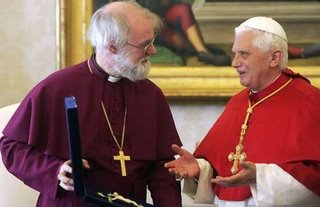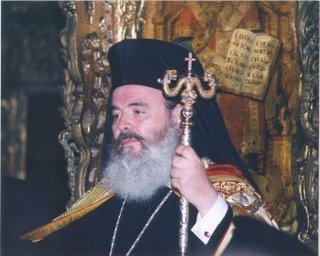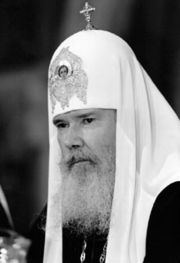Looks like we've got a visitor, Holy Father.
My grandparents lived in an isolated farmhouse in the middle of a large holding in Northern Victoria, far from any main roads. Whenever, therefore, they heard the sound of a vehicle (a rather infrequent event), my Grandmother would call out to my Grandfather: "Looks like we've got a visitor, Dad!"
In some ways, the patriarchs of our various churches have been even more isolated than my grandparents were, but in these closing months of 2006 it looks like everyone is calling out: "Looks like we've got a visitor, Holy Father!"
 The Archbishop of Canterbury is first cab off the ranks, on his first official visit to the Vatican. The statement released by the Pope and the Archbishop doesn't hold out much hope for full visible unity between the Catholic and Anglican churches in the near, or indeed the far, future, but what it does state is that in this age of secularism, there is much that we can be getting on with together despite our differences. And to read what the Archbishop of Canterbury said with the Pope on life issues--including "promoting respect for life from conception until natural death"--that could be quite a bit.
The Archbishop of Canterbury is first cab off the ranks, on his first official visit to the Vatican. The statement released by the Pope and the Archbishop doesn't hold out much hope for full visible unity between the Catholic and Anglican churches in the near, or indeed the far, future, but what it does state is that in this age of secularism, there is much that we can be getting on with together despite our differences. And to read what the Archbishop of Canterbury said with the Pope on life issues--including "promoting respect for life from conception until natural death"--that could be quite a bit. Next it's the Pope's turn to go visiting. This week he has his first official visit with the Ecumenical Patriarch, Bartholemew I, in Istanbul. Meetings between the Patriarch and the Pope are more common these days than they have been in the past. The first meeting following the Schism of 1054 was between Pope Paul VI and Patriarch Athenagoras in 1964 in Jerusalem; the last meeting was in 2001 when Bartholemew I visited JPII in Rome.) Nevertheless, this is a BIG THING.
Next it's the Pope's turn to go visiting. This week he has his first official visit with the Ecumenical Patriarch, Bartholemew I, in Istanbul. Meetings between the Patriarch and the Pope are more common these days than they have been in the past. The first meeting following the Schism of 1054 was between Pope Paul VI and Patriarch Athenagoras in 1964 in Jerusalem; the last meeting was in 2001 when Bartholemew I visited JPII in Rome.) Nevertheless, this is a BIG THING. Perhaps, on the scale of things, an even bigger thing (because he has jurisdiction over about three times as many people) is the expected visit of the head of the Greek Orthodox Church (yes, that's right--the Greek Church is headed by the Archbishop of Athens, not the Patriarch of Constantinople), Arcbishop Christodoulos. whereJohn Paul II was the first Pope to meet with the Archbishop since the Schism in Athens in 2001, but this is the very first time that the Archbishop of Athens has made an official visit to the Pope in the Vatican since the Schism (not counting the fact that he was there for JPII's funeral, which was not an "official visit").
Perhaps, on the scale of things, an even bigger thing (because he has jurisdiction over about three times as many people) is the expected visit of the head of the Greek Orthodox Church (yes, that's right--the Greek Church is headed by the Archbishop of Athens, not the Patriarch of Constantinople), Arcbishop Christodoulos. whereJohn Paul II was the first Pope to meet with the Archbishop since the Schism in Athens in 2001, but this is the very first time that the Archbishop of Athens has made an official visit to the Pope in the Vatican since the Schism (not counting the fact that he was there for JPII's funeral, which was not an "official visit").  Of course, one visit that isn't happening in the near future is the long hoped for visit of the Pope to the Patriarch of Moscow, Alexy II. The old pope died waiting for the invitation, and perhaps Papa Benny will too. But in the "on again, off again" relationship between Rome and Moscow, things seem to be moving in the direction of reconciliation, with both Metropolitan Kirill and Bishop Hilarion calling for some sort of alliance between the Russian Orthodox Church and the Catholic Church. As with the Anglicans, here too it is a recognition that despite the differences between Rome and Moscow, what we have in common is far greater and far more urgent in the face of the threat of secularism. Nevertheless, even on this front there has been a "visit", namely of the local Catholic Archbishop in Moscow, who had an audience with the Patriarch for the very first time on the 8th of November. Today the Archbishop, tomorrow the pope? Well, let's hope so.
Of course, one visit that isn't happening in the near future is the long hoped for visit of the Pope to the Patriarch of Moscow, Alexy II. The old pope died waiting for the invitation, and perhaps Papa Benny will too. But in the "on again, off again" relationship between Rome and Moscow, things seem to be moving in the direction of reconciliation, with both Metropolitan Kirill and Bishop Hilarion calling for some sort of alliance between the Russian Orthodox Church and the Catholic Church. As with the Anglicans, here too it is a recognition that despite the differences between Rome and Moscow, what we have in common is far greater and far more urgent in the face of the threat of secularism. Nevertheless, even on this front there has been a "visit", namely of the local Catholic Archbishop in Moscow, who had an audience with the Patriarch for the very first time on the 8th of November. Today the Archbishop, tomorrow the pope? Well, let's hope so.


.JPG)

3 Comments:
"strictly speaking the Ecumenical Patriarch is head of only about 3000 souls"
Actually, strictly speaking, the Patriarch has jurisdiction over some dioceses in northern Greece (even though these are currently administered by the Church of Greece) as well as Crete, and all the Greek speaking churches of the diaspora. For example, Archbishop Stylianos of Australia is appointed by the Holy Synod of Constantinople presided over by the patriarch. I have no idea what this adds up to, but given the number if Greeks in Melbourne, I dare say it is more than 3000.
The structure of the patriarchate is:
Archdiocese of Constantinople
Metropolis of Chalcedon
Metropolis of Gokceada and Bozcaada
(Imbros and Tenedos)
Metropolis of the Prince's Islands
Metropolis of Derkos
Archdiocese of Crete
Metropolis of Gortyna and Arkadia
Metropolis of Rethymna and Avlopotamos
Metropolis of Kydonia and Apokoronos
Metropolis of Lampi, Syvritos and Sfakia
Metropolis of Ierapytna and Siteia
Metropolis of Petra and Herronisos
Metropolis of Kisamos and Selinos
Metropolis of Arkalohorion, Kastelio and
Vianno
Archdiocese of America
Metropolis of Chicago
Metropolis of New Jersey
Metropolis of Atlanta
Metropolis of Denver
Metropolis of Pittsburgh
Metropolis of Boston
Metropolis of Detroit
Metropolis of San Francisco
Archdiocese of Australia
Archdiocese of Great Britain
Metropolis of Rhodes
Metropolis of Kos
Metropolis of Karpathos and Kasos
Metropolis of Leros, Kalymnos and Astypalaia
American Carpatho-Russian Orthodox Diocese
Ukrainian Orthodox Church in the USA
Ukrainian Orthodox Church of Canada
Metropolis of Korea
Metropolis of Canada
Metropolis of Buenos Aires
Metropolis of Mexico
Metropolis of New Zealand
Metropolitanate of Hong Kong
Metropolis of France
Metropolis of Germany
Metropolis of Austria
Metropolis of Belgium
Metropolis of Scandinavia
Metropolis of Switzerland
Metropolis of Italy
Metropolis of Spain
Albanian Orthodox Diocese of America
Russian Orthodox Exarchate in Western Europe
Yes, thank you for that Tony. It makes my claim that he presides over "only about 3000 souls" (I said this in my original edition of this blog--I have removed it now) look rightly ridiculous. A brief consultation of my eastern church "bible" (" The Eastern Christian Churches: a Brief Survey" by Ronald Roberson, 6th edition 1999) showed that everything you say is correct in terms of the Ecumenical Patriarch's jurisdiction.
I think my original guess of 3000 was based on this comment from Roberson (and others like it more up-to-date from other sources): "Today, the Patriarchate of Constantinople includes the 4000 to 5000 Greeks who remain in Turkey, as well as some sections of Greece." (p47). I believe that figure is much less today. But it seems that these are the figures only for those who actually live within the patriarchate in the sense of the archdiocese of Constantinople. As you point out, Tony, his jurisdiction includes many more beyond the actual patriarchate, up to 3 1/2 million (again according to Roberson). Have I got it right now?
The very real problem for the patriarchate is the shrinking Greek population in Turkey.
As long as the patriarchate stays in Turkey, the Turkish government requires that the patriarch be a Turkish citizen born in Turkey. The number of potential candidates is shrinking. This is compounded by the fact that a bishop must be celibate, removing most of the parochial clergy from the potential list. Because the seminary at Haliki has been closed by the Turkish government, future priests are usually trained in Greece. Unfortunately, a number of them find nice Greek girls and get married, further reducing the pool of candidates.
The patriarchate may have to end up leaving Constantinople (just as the Patriarch of Antioch now lives in Damascus). However this in itself raises problems of where the patriarch would relocate to. Mount Athos has been suggested, as this is under the jurisdiction of the patriarch. But this is remote and is essentially a spiritual community that should not be disrupted by the presence of the patriarch.
The dioceses in the new lands of Greece are technically under the patriarch (they name him as their primate in the liturgy) but they are administered by the Church of Greece. If the patriarch lived in one of these dioceses, it would effectively split the church in Greece in two.
Some have suggested the United States, where a large number of Greeks live under the patriarch's juisdiction. Indeed, the U.S. is a large source of financial support for the belleagured patriarchate. However, it is doubtful that the patriarchate would leave Europe.
Others have suggested the Orthodox Centre in Geneva. This seems to be the most likely, as it is still in Europe and would not tread on the toes of the other Orthodox.
While it is difficult to imagine a revival in the Greek community in Turkey, it will be a sad day if the Patriarch is forced out of Constantinople.
Post a Comment
Subscribe to Post Comments [Atom]
<< Home